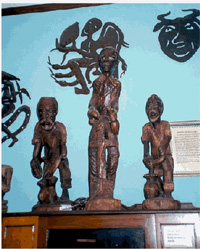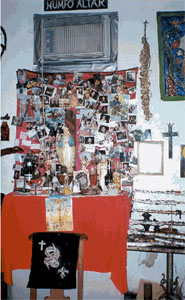Obeah, "Obeah Nights" and Christophine

Zombie in (larger) photos of Voodoo rituals |
Obeah as a part of Caribbean existence
a creolized practice of African religions and Christianity (memory of Africa)
In WSS, Christophine is an obeah woman (a Nanny figure) -- Antoinette's fear--imagining the occult objects hidden in the room (p.18) -- black people's fear of her--Amele (p.61) -- the love portion (p.82) and the sleep medicine for Antoinette (p.91) |
| letter to Francis Wyndham (4/14/1964)
textbook: p.138-9
"I think there were several Antoinettes and Mr Rochesters. Indeed I am sure. . . . Mr R.'s name ought to be changed. . . . In the poem (if it's that) Mr Rochester (or Raworth) consoles himself or justifies himself by saying that his Antoinette runs away after the "Obeah nights" and that the creature who comes back is not the one who ran away. . . Antoinette herself comes back but so changed that perhaps she was 'lost Antoinette'¦." (p.140)--zombie |

humfra altar |
Two major scenes of Christophine in WWS
Christophine and Antoinette (p.64-71)
Christophine and Rochester (p.90-7)
Analyze the powerful presence of Christophine. How does Rhys describe her appearance and her linguistic competence? What is the significance of the fact that she disappears before the end of the novel? Gayatri Spivak and Benita Parry have very different view of Christophine. What is your stand in this argument and why?
Spivak on imperialism: ¡§Christophine is tangential to this narrative. She cannot be contained by a novel which rewrites a canonical English text within the European novelist tradition in the interest of the white Creole rather than the native.¡¨ (p.246)
Two Quotes about Christophine
Parry on Spivak: ¡§what Spivak¡¦s strategy of reading necessarily blots out is Christophine¡¦s inscription as the native, female, individual Self who defies the demands of the discriminatory discourses impinging on her person.¡¨ (p.248)